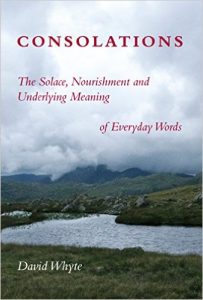 Consolations: The Solace, Nourishment, and the Underlying Meaning of Everyday Words by David Whyte
Consolations: The Solace, Nourishment, and the Underlying Meaning of Everyday Words by David Whyte
Reviewed by David Lorimer
David Whyte is an internationally acclaimed poet who also speaks in a business context. I remember him at the 1997 State of the World Forum in San Francisco, reciting some of his own poems to great effect, often repeating lines twice so that the listener could absorb them fully. This book is unusual in having no introduction or blurb – just a subtitle ‘the solace, nourishment and underlying meaning of everyday words.’ The cover of damp low cloud conveys something of the tone. Commentaries on the words are arranged alphabetically, beginning with alone and ending with work. Just to give a flavour, there is anger, beauty, besieged, crisis, despair, forgiveness, gratitude, heartbreak, honesty, longing, nostalgia, pain, regret, robustness, shadow, silence, unconditional, vulnerability and withdrawal. There are just two jokers in the pack: Istanbul and Rome, the first standing for a bridge and meeting point near Troy and the second the eternal city ‘only in the sense that disappearance is eternal’. Whyte sees Rome as a series of interpretations of the past attempted by each fleeting present, a centre of spiritual materialism that celebrates the insubstantiality of human striving – decay and disappearance.
While life is certainly transient, we are always alive in the present. At one level we are indeed alone, but that does not mean that we are lonely, and we long to belong. Whyte evokes the besieged nature of modern life while noting that attention to beauty can bring a moment of self forgetfulness, a foretaste of giving up the self at death. Our imperfections mean that we are always in need of forgiveness and compassion, even absolution at the end. There is a keen sense of suffering running through the book, for instance in the reflection on heartbreak and caring deeply. There is also a celebration of life in joy and generosity.
Readers are bound to find some reflections more sympathetic than others, depending on their temperament and experience of life and the extent to which they feel that they act on life or are acted upon. For Whyte, love seems just out of reach, silence is frightening as an intimation of the end. He sees vulnerability as an abiding undercurrent of our natural state, so that the only choice we have is how we inhabit this in terms of loss and death. There are also other lives we might have lived had we chosen differently. He invites us as pilgrims to the courageous life ‘that is equal to this unceasing tidal and seasonal becoming.’ We are made of movement, and yet there is a stillness at the heart. This beautifully written book provides readers with an emotional mirror in which the tones of our lives are reflected – as the subtitle suggests, there is indeed solace and nourishment in these everyday words. www.davidwhyte.com
